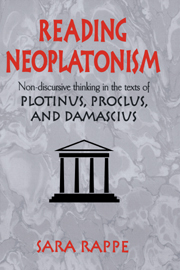Book contents
- Frontmatter
- Contents
- Preface: Discursive Strategies and Neoplatonic Texts
- Acknowledgments
- List of Abbreviations
- 1 Introduction. Representing a Tradition: Exegesis, Symbol, and Self-reflection
- PART I LANGUAGE IN THE ENNEADS
- PART TWO TEXT AND TRADITION IN NEOPLATONISM
- 6 History of an Enigma: Mathematical Symbolism in the Neoplatonic Tradition
- 7 Transmigrations of a Myth: Orphic Texts and Platonic Contexts
- 8 Language and Theurgy in Proclus' Platonic Theology
- 9 Damascius' Ineffable Discourse
- 10 Conclusion: Reading Neoplatonism
- References
- General Index
- Index Locorum
6 - History of an Enigma: Mathematical Symbolism in the Neoplatonic Tradition
Published online by Cambridge University Press: 24 October 2009
- Frontmatter
- Contents
- Preface: Discursive Strategies and Neoplatonic Texts
- Acknowledgments
- List of Abbreviations
- 1 Introduction. Representing a Tradition: Exegesis, Symbol, and Self-reflection
- PART I LANGUAGE IN THE ENNEADS
- PART TWO TEXT AND TRADITION IN NEOPLATONISM
- 6 History of an Enigma: Mathematical Symbolism in the Neoplatonic Tradition
- 7 Transmigrations of a Myth: Orphic Texts and Platonic Contexts
- 8 Language and Theurgy in Proclus' Platonic Theology
- 9 Damascius' Ineffable Discourse
- 10 Conclusion: Reading Neoplatonism
- References
- General Index
- Index Locorum
Summary
Pythagoreanism, Oral Teachings, and Neoplatonic Textuality
The language of Neoplatonism is the language of symbols. In the next chapters I want to discuss two different systems that are quite pervasive within Neoplatonism: Orphic symbolism and Pythagorean symbolism. These systems are tied together historically, inasmuch as the traditions that their names represent are often conflated among ancient authors. Nevertheless, two distinctive series of metaphors are associated respectively with Orphism and Pythagoreanism. Whereas the Orphic tradition is cosmological (Orpheus sings about the birth of the cosmos, and so narrates a cosmogony), Pythagorean symbolism is essentially nonnarrative and involves mathematical and geometric concepts. Disparate as ways of framing the world, both these systems are central to Neoplatonic texts and become important vehicles through which the Neoplatonists attempt to convey their non-discursive methodologies.
The thought exercises that have been the subject of the previous pages involve mathematical and geometric symbolism. In this chapter, I show that the history of this symbolism in Neoplatonic texts helps us to enter into a reconstruction of Neoplatonic self-representation precisely because these symbols are so powerfully charged by their historical eminence and also by their traditional weight. Within the history of Platonism, oscillation between a tendency to Platonize and a tendency to Pythagoreanize forms the basis of an ongoing dialogue concerning the nature of philosophical purity and authenticity. By engaging with the Pythagorean tradition, the Neoplatonists bring about their own insertion into a tradition that they perceive as primordial or as a pristine form of philosophy.
- Type
- Chapter
- Information
- Reading NeoplatonismNon-discursive Thinking in the Texts of Plotinus, Proclus, and Damascius, pp. 117 - 142Publisher: Cambridge University PressPrint publication year: 2000



